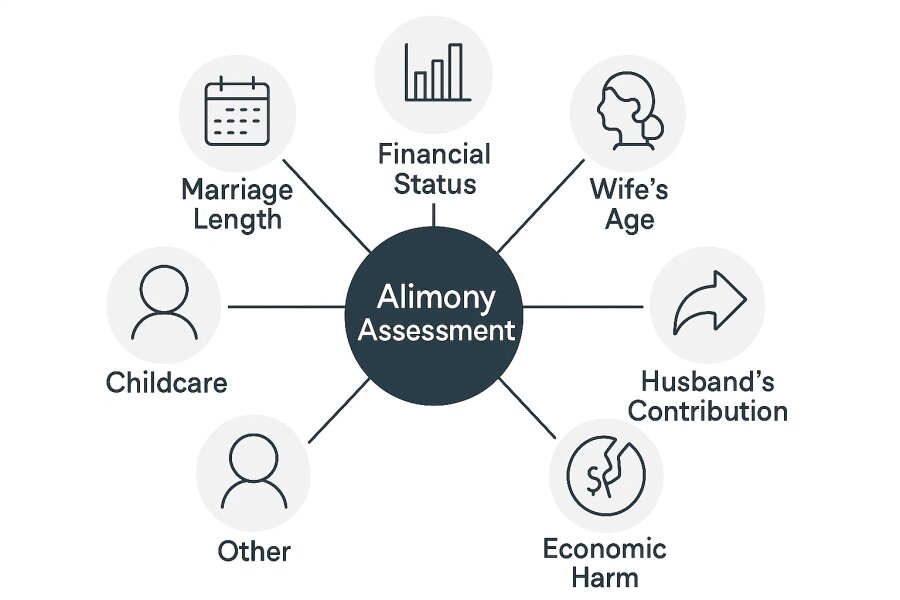The United Arab Emirates has fundamentally transformed its approach to family law for non-Muslim expatriates, introducing a secular legal framework that represents one of the most progressive reforms in the region. With the implementation of Federal Decree-Law No. 41 of 2022 on Civil Personal Status, which has been fully operational since February 2023, expatriates now have access to streamlined civil marriage procedures and straightforward no-fault divorce in the UAE. This comprehensive guide explores how these changes affect expatriates navigating UAE family law in 2025.

Understanding the New Legal Framework
The UAE's strategic creation of a parallel legal system marks a decisive shift from the previous unified approach where Islamic Sharia principles served as the default for all residents. This dual-track system establishes a distinct secular pathway for non-Muslims while maintaining a modernized Sharia-based framework for the Muslim population.
Federal Decree-Law No. 41 of 2022 applies to all non-Muslims, whether UAE nationals or foreign residents. The law explicitly governs marriage, divorce, child custody, alimony, and inheritance matters. Article 4 of this legislation establishes fundamental equality between men and women in testimony, inheritance rights, divorce access, and child custody arrangements.
It's crucial for expatriates to distinguish this law from Federal Decree-Law No. 41 of 2024, which came into effect in April 2025. Despite sharing the same number, the 2024 law specifically governs Muslims and represents a modernization of Sharia-based personal status frameworks. Non-Muslim expatriates must ensure their cases fall exclusively under the 2022 Civil Personal Status Law to avoid confusion and flawed legal strategies.
The successful implementation of Abu Dhabi's pioneering Law No. 14 of 2021 on Civil Marriage served as a proof of concept for the federal reform. The capital's initiative demonstrated both the viability and demand for such a system among the expatriate community, paving the way for nationwide adoption.
Civil Marriage in the UAE: A Secular Approach
Civil marriage in the UAE now represents a purely secular contract between a man and a woman, completely detached from religious requirements. This framework eliminates traditional prerequisites including religious ceremonies, guardian consent for brides, and mandatory medical screening that were previously part of the legal process.

Eligibility Requirements
To marry under the new civil law, couples must meet specific criteria outlined in Article 5:
Both parties must be non-Muslim and have attained at least 21 Gregorian years of age, proven through official documentation from their country of nationality. However, Abu Dhabi permits civil marriage at 18 years old, creating an important distinction between emirates.
Both individuals must explicitly express free consent before an Authentication Judge without any legal impediments. The law prohibits marriages between close relatives including siblings, children, grandchildren, uncles, and aunts. Additionally, both parties must sign disclosure forms declaring any previous marriages and confirming they're not currently in another marital relationship.
The Marriage Process
The procedure for obtaining a civil marriage follows a straightforward administrative path. Couples initiate the process by submitting applications through judicial department portals or authorized service centers. Required documentation typically includes valid passports, Emirates IDs for residents, and proof of single status or properly attested divorce decrees if previously married.
Couples with pre-nuptial agreements should submit them alongside their marriage applications. The new civil framework explicitly validates these agreements under Article 6, allowing couples to determine asset division, spousal maintenance terms, and debt allocation arrangements.
During the scheduled ceremony, couples appear before an Authentication Judge to verbally confirm consent. After signing official marriage contracts and disclosure forms, the judge authenticates the documentation for registration in the civil marriage register. Marriage certificates are typically issued shortly after ceremonies, with Dubai's express service offering same-day or 24-hour processing.
Emirate-Specific Variations
While federal law provides the overarching framework, practical implementation varies between emirates. Abu Dhabi's Civil Family Court accepts applications from both residents and tourists, with no residency requirement. Standard service costs AED 300 with processing within 10 working days, while express service at AED 2,500 provides one-day processing.
Dubai Courts require at least one party to be an emirate resident. Their express service, priced between AED 220-2,500, enables marriage license issuance within 24 hours. Neither emirate requires witnesses, as notary public officers serve as legal witnesses.
For expatriates requiring specialized guidance on marriage procedures and related legal matters, consulting with experienced family lawyers in the UAE can ensure compliance with all requirements.
No-Fault Divorce: Streamlining Separation
The introduction of no-fault divorce in the UAE through "divorce by unilateral will" represents one of the most significant changes in UAE family law in 2025. Article 7 establishes that either spouse can request divorce simply by expressing their desire to separate before the court.
This system eliminates the need to justify requests, prove harm, or assign blame. The process is intentionally non-adversarial, allowing couples to dissolve marriages with dignity and privacy. Both spouses have equal access to this mechanism, reinforcing gender equality principles.

The Divorce Process
The new framework removes several bureaucratic hurdles from previous systems. Most significantly, Article 3 eliminates mandatory reconciliation phases. Unlike the old requirement for Family Guidance Committee mediation, petitioning spouses can file directly with competent civil family courts.
Once filed, courts ensure formal notification of the other spouse. While respondents can participate in proceedings concerning ancillary matters, they cannot prevent divorce decrees from being issued. The law facilitates rapid resolution by allowing divorces to be granted at first hearings.
Timeline and Costs
The streamlined process significantly reduces timelines compared to previous fault-based systems. In Abu Dhabi, no-fault divorces can be completed within approximately 30 days. Dubai processes straightforward cases within one to three months depending on court availability.
Direct court filing fees remain nominal at AED 200-300. Legal representation costs vary based on case complexity. Amicable, uncontested divorces might incur legal fees ranging from AED 20,000 to AED 40,000, though costs increase substantially with contested custody or financial disputes.
Child Custody Laws in the UAE: Joint Parental Responsibility
The new law fundamentally alters child custody approaches for non-Muslims, moving from traditional custodian-guardian models to default joint parental custody principles. Article 10 establishes that divorced parents share responsibility for raising children together as a right of the child to maintain relationships with both parents.
Both parents retain equal custody rights until children reach 18 years old, after which children choose their arrangements. However, courts retain authority to grant sole custody if joint arrangements would harm children's welfare or if parents prove unfit.
When parents cannot agree on custody aspects, courts make determinations based on children's best interests. This shift empowers both parents equally in major decisions regarding education, healthcare, and relocation while creating complex dynamics regarding financial responsibilities.
Financial Settlements: Discretionary Approaches
The Civil Personal Status Law adopts nuanced, discretionary approaches to post-divorce financial support rather than automatic or formulaic payments. Courts evaluate comprehensive circumstances when making awards.
Alimony Considerations
Divorced wives may apply for alimony from ex-husbands following divorce decrees. Courts evaluate multiple factors including marriage length, wife's age, both parties' financial situations, husband's contribution to divorce, compensation for harm, economic impact of unilateral divorce, and wife's childcare diligence.
While divorce itself is no-fault, financial consequences can be fault-based. Evidence of misconduct during marriage remains highly relevant to financial proceedings despite being irrelevant for obtaining divorces. Alimony ceases upon remarriage or when custody arrangements end.

Child Support Obligations
Primary financial responsibility for children rests with fathers until sons complete education or daughters marry, provided they cannot self-support. Child support covers housing, education, healthcare, and general living costs to maintain accustomed living standards.
Courts determine amounts based on fathers' income evidence and children's demonstrated needs without fixed statutory formulas. Fathers also cover mothers' custody-related expenses for up to two years post-divorce.
Asset Division and Property Rights
Unlike Western jurisdictions, the UAE doesn't follow community property regimes or mandate automatic 50/50 asset splits. The guiding principle involves asset separation where spouses retain property registered in their names.
Real estate, bank accounts, vehicles, and investments typically remain with registered owners. Jointly owned assets may require separate civil cases examining each party's contributions. Divisions aren't necessarily equal but reflect documented financial contributions.
This approach makes legally sound pre-nuptial agreements indispensable for asset protection. The new law clearly enables couples to agree on asset division arrangements in advance, providing crucial protection for high-net-worth individuals.
Choosing Between UAE Law and Home Country Law
Article 1 preserves expatriates' rights to choose governing law for family matters. Expatriates can proceed under UAE civil law or petition courts to apply their nationality's law. This choice fundamentally alters case outcomes, particularly regarding financial settlements.
Under UAE civil law, asset separation principles apply with discretionary, potentially limited spousal maintenance. Conversely, English law might provide 50/50 starting points for matrimonial assets regardless of registration, with longer-term or lifetime maintenance possibilities.
Successfully applying foreign law requires submitting complete, authenticated foreign statutes with official translations. Any procedural errors in presenting foreign law can result in courts reverting to UAE civil law by default, potentially nullifying entire case strategies.
Document Attestation Requirements
Document attestation remains a non-negotiable requirement for legal validity across jurisdictions. Foreign documents require sequential attestation starting with home country notarization, followed by foreign ministry attestation, UAE embassy attestation abroad, legal translation if necessary, and final MOFAIC attestation in the UAE.
UAE documents for international use require Ministry of Justice attestation, MOFAIC attestation, destination country embassy attestation, and potentially further attestation upon arrival. This complex process often takes weeks or months, making professional attestation services valuable for avoiding delays.
Navigating the Legal Landscape
The UAE's progressive family law reforms offer expatriates unprecedented clarity and efficiency in managing personal status matters. The secular framework provides culturally aligned procedures while maintaining flexibility for those preferring home country law application.
Success in navigating this system requires understanding the distinction between federal and emirate-specific procedures, recognizing the implications of choosing between UAE and foreign law, and maintaining meticulous documentation throughout all processes.
For expat divorce in the UAE or civil marriage in the UAE proceedings, professional legal guidance proves invaluable. Experienced family lawyers can navigate procedural complexities, advise on jurisdiction choices with profound financial implications, and ensure proper documentation and attestation.
The transformation from unified Sharia-based systems to parallel secular tracks represents the UAE's commitment to creating an inclusive environment for its diverse population. While the new framework simplifies many processes, strategic decisions regarding law application, financial planning through pre-nuptial agreements, and careful attention to procedural requirements remain essential.
As UAE family law in 2025 continues evolving, expatriates benefit from staying informed about regulatory changes and maintaining proactive approaches to family law matters. Whether entering marriages, facing relationship breakdowns, or planning family futures, understanding these legal frameworks enables informed decision-making during life's most significant personal milestones.
The UAE has successfully positioned itself as an attractive jurisdiction for resolving expatriate family matters, combining efficiency with fairness. For those navigating these waters, the path forward is clearer than before, though expert navigation remains advisable for optimal outcomes in this sophisticated legal landscape.



